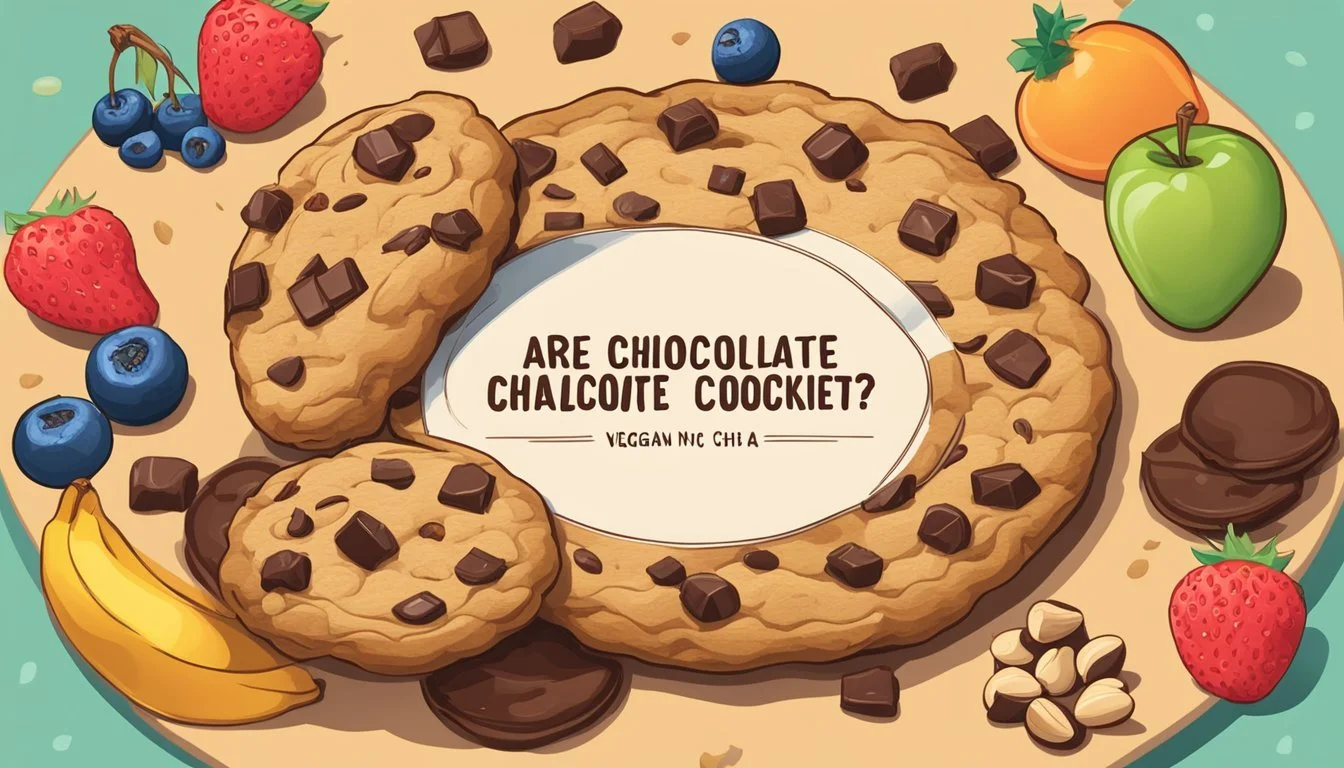Are Chocolate Chip Cookies Vegan?
Unveiling the Ingredients
Chocolate (What wine goes well with chocolate?) chip cookies are a beloved treat across the globe, known for their sweet, buttery flavor and delightful chunks of chocolate. Traditionally, these cookies are not vegan, as they contain ingredients such as dairy butter, milk chocolate chips, and eggs. However, with the growing demand for plant-based alternatives, vegan chocolate chip cookies have become increasingly available, proving that the essence of this classic cookie can indeed be captured without the use of animal products.
To create vegan chocolate chip cookies, substitutions are made using plant-based ingredients. Vegan bakers often utilize dairy-free butter, non-dairy milk such as almond or oat milk, and egg replacements which can range from commercial egg replacers to natural alternatives like flax or chia seeds mixed with water. The chocolate chips used in vegan cookies are specifically made without milk solids, ensuring they adhere to vegan standards.
The rise of vegan chocolate chip cookies speaks to the versatility of baking in accommodating dietary preferences and ethical choices. While the basic components of the cookie—flour, sugar, and leavening agents—remain the same, the adaptability of the recipe allows for a broad audience to enjoy chocolate chip cookies in alignment with a vegan lifestyle.
Understanding Vegan Baking
Creating vegan chocolate chip cookies requires an understanding of how traditional baking ingredients can be replaced with plant-based alternatives. This section provides insights into the specific ingredient substitutions that ensure vegan cookies are just as delightful as their non-vegan counterparts.
Classic Ingredients vs. Vegan Alternatives
Traditional chocolate chip cookies often include ingredients such as eggs, butter, and milk, all of which are animal-based. Vegan cookie recipes, however, utilize replacements like:
Butter: Vegan butter or oils such as refined coconut oil or vegetable oil.
Milk: Plant-based milk like almond milk.
Eggs: Binding agents like flax eggs or applesauce.
Chocolate Chips: It's crucial to ensure that the chocolate chips are dairy-free to be considered vegan.
The Role of Fats in Vegan Cookies
Fats contribute to the cookie's texture and richness. In vegan cookies:
Vegan Butter: Mimics the creaminess of traditional butter.
Coconut Oil: Provides a buttery texture; refined coconut oil has a neutral taste.
Sweeteners and Sugars
A variety of sweeteners can be used in vegan baking, with each imparting a different flavor profile:
Granulated Sugar: Check that it's not processed through bone char to be truly vegan.
Brown Sugar/Coconut Sugar: Adds moisture and a rich, caramel-like flavor.
Cane Sugar: Often a vegan choice, ensuring it's unrefined.
Leavening Agents and Their Substitutes
Leavening agents help the cookies rise and become fluffy. Vegan-friendly options are:
Baking Soda: Works well, especially when acidic ingredients are present.
Baking Powder: Commonly used, but ensure it's aluminum-free for a cleaner taste.
Binding Agents for Vegan Cookie Dough
Without eggs, vegan cookie dough needs other ingredients to bind it together:
Flax Egg: Ground flaxseeds mixed with water create a gel-like consistency.
Apple Sauce/Pumpkin: Can also provide moisture and act as a binder.
Cornstarch: Offers structural integrity to the cookies.
Vegan Chocolate Chip Cookies Recipe
Creating delicious vegan chocolate chip cookies is easy with the right ingredients and methods. This section will guide you through selecting vegan chocolate, mixing the dough, baking, customizing, and presenting your cookies.
Selecting Vegan Chocolate
When searching for chocolate chips for your vegan cookie recipe, ensure that they are free of all animal products. Dark chocolate chips are often a safe choice, as they typically contain fewer dairy products than milk chocolate. Brands specifically labeling their chocolate as vegan are preferable to guarantee they contain no animal derivatives.
Mixing and Making the Dough
To start your cookie dough, combine dry ingredients such as flour, baking soda, and salt in one bowl. In another, cream together vegan butter and sugars until smooth. Mix in a vegan alternative to eggs, such as a flax egg or commercial egg replacer. Gradually add the dry mixture to the wet ingredients and mix until a consistent dough forms. Finally, stir in your vegan chocolate chips or chunks.
Baking Process Explained
Preheat your oven—this varies but is often around 350-375 degrees F (177-190 degrees C). Scoop out balls of cookie dough using a cookie scoop and place onto a lined baking tray. Ensure there is enough space between each to allow for spreading. Bake according to the recipe—generally 9-12 minutes, or until the edges are golden and the centers have set. Baking time can vary based on cookie size and individual oven characteristics.
Customizing Your Vegan Cookies
To tailor to personal preferences or dietary needs, experiment by adding ingredients like oatmeal, nuts, walnuts, cranberries, or use gluten-free flour blend for gluten sensitivity. For a different twist, try adding vegan peanut butter to the mix. If you prefer a chunkier texture, replace chips with chocolate chunks.
Final Touches and Presentation
Once baked, transfer the cookies to a wire rack to cool. This prevents them from cooking further on the hot tray which can lead to overly hard cookies. Sprinkle with flaky sea salt for a sweet and savory contrast if desired. If you need to store the cookies, wait for them to cool completely; they can be frozen to retain freshness. Serve them on a platter for presentation, enjoying the fruits of your simple ingredients combining into something remarkable.
Complementary Vegan Treats
While vegan chocolate chip cookies are a delightful treat, exploring the broader spectrum of vegan desserts can open up a world of indulgence. From simple homemade sweets to rich, creamy delights, there's a range of options to complement any vegan cookie selection.
Exploring Vegan Desserts Beyond Cookies
Vegan dessert options extend far beyond the realm of cookies, offering a variety of flavors and textures. Vegan sugar cookies and vegan oatmeal chocolate chip cookies are easy-to-make at home and provide a sweet variation to enjoy. For those who favor a hint of spice, vegan snickerdoodles, with their cinnamon-sugar coating, are a perfect choice. These treats maintain a balance of sweet and spice, making them a complementary diversity to the classic chocolate chip cookies.
Pairing with Vegan Ice Cream and Milk
Pairing cookies with a cold beverage or dessert can elevate the overall experience. Non-dairy ice cream, whether based on soy, almond, or coconut milk, is an indulgent complement to vegan cookies. It’s easy to find commercial brands, like Enjoy Life, that cater to vegan preferences. Alternatively, pairing cookies with a glass of non-dairy milk—soy or almond—brings forth the familiar comfort of milk and cookies sans animal products. Here's a quick guide for pairings:
Non-Dairy Ice Cream: Choose from vanilla, chocolate, or specialty flavors for a creamy contrast.
Vegan Milk: Almond milk offers a nutty flavor, while soy milk delivers a richer taste.
Savory Alternatives for Balanced Indulgence
For those seeking a balance between sweet and savory, vegan treats offer a wide range. Homemade savory options might include spiced nuts or roasted chickpeas, which can cleanse the palate after enjoying a dessert. These snacks are not only simple to make but also provide nutritional benefits, such as protein and essential fats. Serving a savory element alongside vegan cookies creates a varied and satisfying snack platter.
Practical Tips and Tricks
When venturing into the world of vegan chocolate chip cookies, adopting specific techniques can make all the difference in texture and taste. These practical tips and tricks will assist in achieving the desired consistency, flavor, and longevity of your cookies.
Making Vegan Cookies Soft and Chewy
To ensure vegan cookies come out soft and chewy, the type of sugar and fat plays a crucial role. Use brown sugar or coconut sugar, as they contain more moisture than white sugar, often due to their molasses content. Additionally, melted vegan butter can help create a chewier texture. Maintain a balance between baking soda and baking time; slightly underbaking the cookies can result in a softer center.
How to Store and Preserve Vegan Cookies
Storage is key to preserving the texture and taste of vegan chocolate chip cookies. Once cooled on a wire rack, store them in an airtight container at room temperature on the counter for up to a week; they also keep well in the refrigerator. For long-term storage, freeze the cookies, ensuring they are wrapped properly to avoid freezer burn. There is no chilling time required before freezing.
Vegan Baking Equipment Essentials
Reliable baking equipment is essential for consistent results. A stand mixer or whisk can be used to cream together vegan butter and sugar. Have a spatula on hand to fold in the chocolate chips gently. Baking trays should be lined with parchment paper or Silpat to prevent sticking and a wire rack is necessary for cooling, to avoid soggy bottoms.
Adjustments for Altitude and Humidity
Altitude and humidity can affect the way cookies rise and set. At high altitudes, increase oven temperature slightly and reduce baking time. If in humid climates, you may need to add a bit more flour to prevent overly spread and thin cookies. These adjustments prevent cookies from becoming too crispy or flat.
Troubleshooting Common Vegan Baking Issues
If cookies are spreading too much, the dough may be too warm; refrigerating it before baking can help maintain shape. When cookies don't spread enough, the dough might be overworked or too dry — add a small amount of non-dairy milk to adjust consistency. If they aren’t rising correctly, double-check the freshness of your baking soda, as its leavening power diminishes over time.
Lifestyle and Health Aspects
Adopting a plant-based diet often includes alterations to traditional recipes. Vegan chocolate chip cookies are an example of how classic treats can be modified for a vegan lifestyle, aligning with health-focused dietary choices.
Benefits of Vegan Baking
Vegan chocolate chip cookies typically derive from plant-based ingredients, which may lead to health benefits. Here are specific advantages:
Reduced Saturated Fat: Many vegan cookie recipes substitute plant-based oils for butter, which can lower the amount of saturated fat per serving.
Allergy-Friendly: Vegan cookies often eschew common allergens like dairy and eggs, making them suitable for a wider range of individuals.
Nutrient-Rich: Select recipes include ingredients like almond flour or flaxseeds, contributing beneficial nutrients that may not be present in traditional cookies.
The best vegan chocolate chip cookies balance taste with health, often incorporating ingredients like almond butter or coconut oil for richness without relying on animal products. Connoisseurs favor recipes that replicate the chewy, moist texture synonymous with classic cookies while adhering to vegan standards.
When it comes to preparation, vegan baking is typically simple and accessible. Essential components like vegan butter and non-dairy milk have mainstreamed, making it easier for home bakers to experiment and indulge in vegan baking. The popularity and availability of vegan chocolate have also soared, with many brands now offering dairy-free chocolate chip options suitable for vegan baking.




